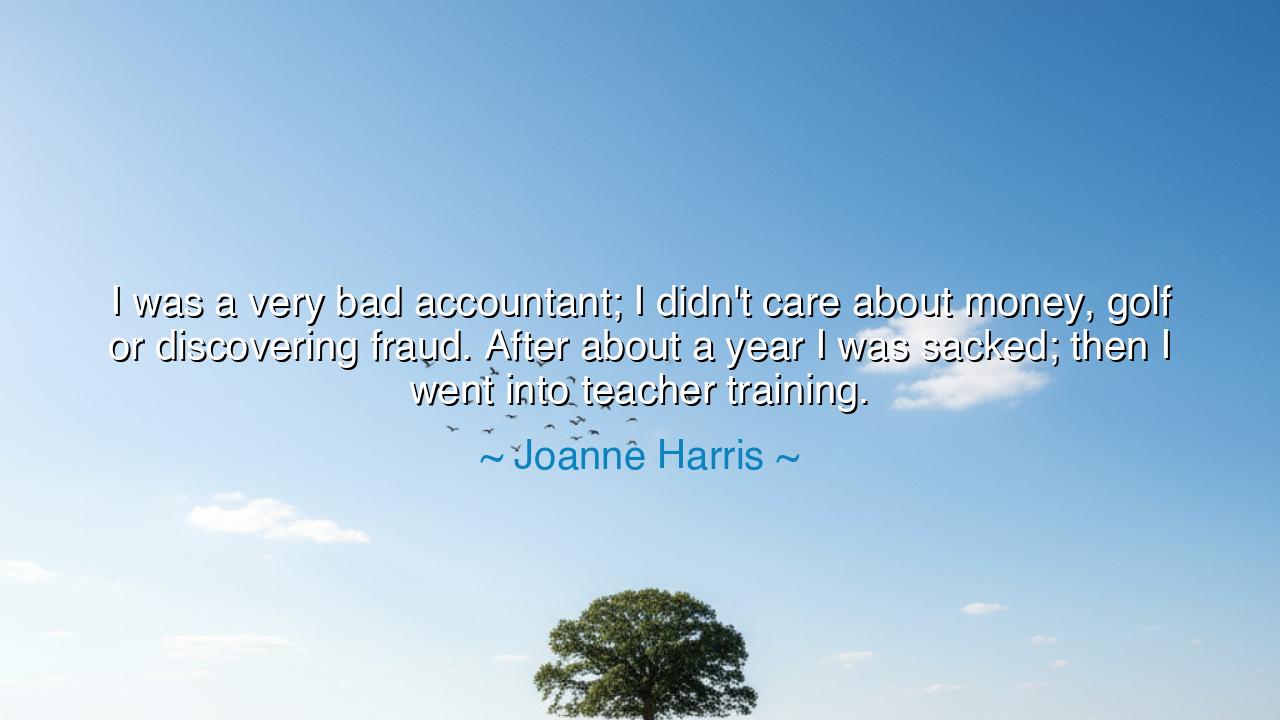
I was a very bad accountant; I didn't care about money, golf or
I was a very bad accountant; I didn't care about money, golf or discovering fraud. After about a year I was sacked; then I went into teacher training.






When Joanne Harris confessed, “I was a very bad accountant; I didn’t care about money, golf or discovering fraud. After about a year I was sacked; then I went into teacher training,” she revealed more than the story of a career gone astray—she revealed the eternal struggle of finding one’s true calling. Her words remind us that failure in one realm is not the end, but often the beginning of the path we were meant to walk. In her case, dismissal from a profession that did not stir her spirit became the doorway to a vocation more aligned with her nature: the noble craft of teaching.
The origin of this thought lies in the recognition that society often pushes individuals into roles unsuited for their hearts. The world prizes certain paths—wealth, prestige, conformity—but not all souls are fashioned for such roads. Harris’s disinterest in money, in the social games of golf, or the technical hunt of fraud detection, marked her as unfitted for the accountant’s life. And though she was judged “bad” in that field, she was not lesser as a human being. Rather, her dismissal was an act of liberation, freeing her from a role that was never truly hers.
History is filled with such examples. Consider Albert Einstein, who struggled in the rigid world of formal schooling and was dismissed as a poor student by his teachers. He even failed an entrance exam to a polytechnic institute. Yet this “failure” did not define him; instead, it pushed him to explore physics in his own way, eventually rewriting the very laws of science. Harris’s story is smaller in scale but carries the same truth: failure in one sphere can be the spark of greatness in another.
The ancients also knew this wisdom. In the tales of Heracles, the hero undertakes labors that often appear misaligned with his nature—tasks of servitude and humiliation. Yet each one shapes him, guiding him closer to his true destiny. So too in Harris’s story: the humiliation of being sacked was not destruction, but transformation. It stripped away the false path and forced her to turn toward teaching, a role that allowed her creativity, wisdom, and passion to flourish—and, eventually, led her to become the celebrated storyteller we know today.
The meaning of Harris’s words is both humbling and empowering. She teaches us that being “bad” at something is not a curse, but often a signpost. To fail at what is not yours is to be redirected toward what is. The tragedy is not in failure, but in clinging to a false life out of fear. True wisdom lies in recognizing when the soul is mismatched with its labor, and having the courage to step onto a new road.
The lesson for us is clear: do not measure your worth by success in roles that do not resonate with your heart. If you fail at such things, rejoice—for life is pointing you elsewhere. Seek the path where your spirit feels alive, where your labor is not mere survival but contribution. For Harris, this was teaching, and through it she found her voice as a writer. For you, it may be another calling—but it will be one that aligns with who you truly are.
Practically, live this teaching by reflecting upon your own labors. Ask yourself: does this work awaken me, or does it numb me? If you are “bad” at what you do because your heart is absent from it, dare to seek what your heart longs for. Accept failure not as condemnation, but as a teacher guiding you toward authenticity. And if you are young, take courage: the path to your calling may wind through mistakes and dismissals, but each turn is shaping you for your true work.
Thus Harris’s words shine with ancient wisdom: failure in the wrong place is the beginning of success in the right one. She shows us that to be cast out of what does not suit you is a gift, not a curse. Let us therefore welcome failure when it frees us from falsehood, and let us walk boldly toward the work that calls our hearts—where we may finally, truly, belong.






AAdministratorAdministrator
Welcome, honored guests. Please leave a comment, we will respond soon